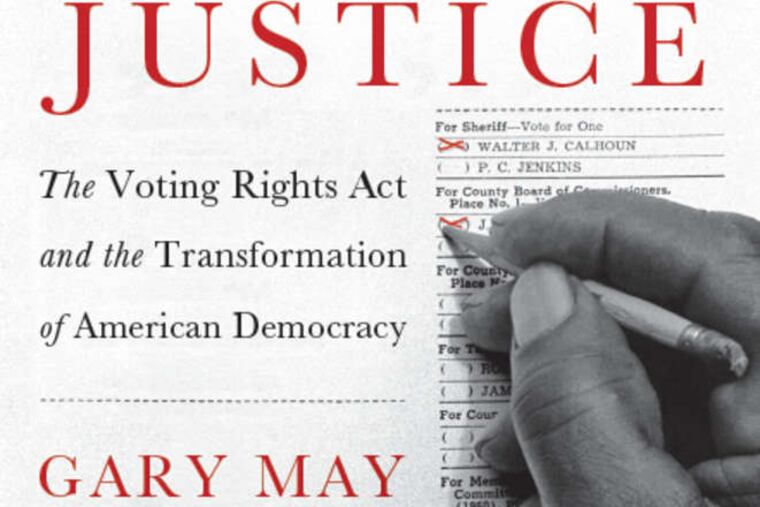The politics behind voting rights
Tucked inside Gary May's solid account of the years surrounding the passage of the Voting Rights Act of 1965 is a reminder of how this book could have been far more relevant.

The Voting Rights Act and the Transformation of American Democracy
By Gary May
Basic Books. 336 pp. $28.99
nolead ends nolead begins
Reviewed by Paul Jablow
Tucked inside Gary May's solid account of the years surrounding the passage of the Voting Rights Act of 1965 is a reminder of how this book could have been far more relevant.
In 1908, he briefly notes, New York City officials tried to hold down the Jewish vote by fixing registration days on the Sabbath or high holidays.
He also reviews the voter ID laws of various states, including Pennsylvania, where House Majority Leader Mike Turzai made his perhaps unintentionally revealing boast that the law could deliver the state to Republican Mitt Romney in the 2012 presidential election.
May, a professor of history at the University of Delaware, has obviously timed his book to coincide with the U.S. Supreme Court's review of the Voting Rights Act, particularly the part that singles out six Southern states - Alabama, Georgia, Louisiana, Mississippi, South Carolina, and Virginia - by requiring that changes in their voting procedures be approved by the U.S. Justice Department or a federal court.
During arguments before the court in February, Chief Justice John G. Roberts Jr. expressed skepticism that this part of the act, known as Section 5, was still needed, citing higher turnout by blacks in Mississippi than in Massachusetts.
Some weeks later, New York Times statistics guru Nate Silver countered with an analysis of how Roberts had cherry-picked his numbers, and raised the question whether higher black turnout in the South was proof that Section 5 was no longer necessary or proof that it had worked.
If Roberts meant that the pre-1965 Deep South, with the beatings, threats, economic intimidation, and even murder of blacks seeking the vote, is dead, that's hard to dispute.
But what wasn't before the court - and what one wishes May had spent more time reviewing - was the whole sorry history of attempts to hold down minority voting, including not just physical intimidation but voter ID laws, longer lines at voting booths in minority areas of Ohio and other Northern states, and selective shortening of registration hours.
"Our leverage in elections quite candidly goes up as the voting populace goes down," May quotes the late conservative political activist and commentator Paul Weyrich as saying in 1980.
"In the future," May wrote - accurately, as it turns out - "the enemies of the Voting Rights Act would look to a conservative-dominated Supreme Court to take up the fight they were too cowardly to risk in Congress." It wasn't long before Associate Justice Antonin Scalia was referring to Section 5 as a "racial entitlement."
May accomplishes what he set out to do, rendering "a dramatic account of the struggle that finally won African Americans the ballot."
It's a story that is chilling in many ways and inspiring in others. It has been decades since American citizens have been forced to deal on a grand scale with figures like Jim Clark, the blustering, bullying, nightstick-wielding sheriff of Dallas County, Alabama. The courage it took to do so was beyond remarkable.
May explores the testy relationship between the Rev. Dr. Martin Luther King Jr. and President Lyndon B. Johnson with nuance and detail. Johnson's commitment to civil rights may have been an act of great political courage and foresight, but he had other legislative fish to fry, as well, and he wasn't about to let King spoil the entire meal. Personally uneasy with each other, particularly because of King's opposition to the war in Vietnam, each also knew that he needed the other.
And May's account of Johnson facing down Alabama Gov. George Wallace over Wallace's refusal to force county registrars to register black voters is one of the best descriptions anywhere of the fabled "LBJ Treatment":
Deliberately seating the diminutive Wallace on a spongy couch that sank him another foot lower and pulling his rocking chair closer, "the six-foot-four Johnson . . . towered over the helpless Wallace.
"George, don't you s- me as to who runs Alabama. . . . George, you're f- over your President. Why are you f- over your President?"
Equally valuable is May's account of the key role played by Senate Minority Leader Everett McKinley Dirksen in getting the Voting Rights Act passed. While it would likely be impossible today to find a Republican in Congress who would publicly support denying blacks the right to vote, it is equally impossible to imagine a key GOP senator and the Obama administration working as closely on a major piece of legislation as did Johnson and the Illinois Republican.